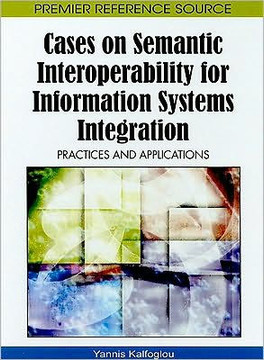
River Publishers
Semantic Interoperability Issues, Solutions, Challenges
Product Code:
9788792329790
ISBN13:
9788792329790
Condition:
New
$133.90

Semantic Interoperability Issues, Solutions, Challenges
$133.90
Semantic technologies are experimenting an increasing popularity in the context of different domains and applications. The understanding of any class of system can be significantly changed under the assumption any system is part of a global ecosystem known as Semantic Web. The Semantic Web would be an evolving extension of current Web model (normally referred as Syntactic Web) that introduces a semantic layer in which semantics, or meaning of information, are formally defined. So, semantics should integrate web-centric standard information infrastructures improving several aspects of interaction among heterogeneous systems. This is because common interoperability models are progressively becoming obsolete if compared with the intrinsic complexity and always more distributed focus that feature modern systems. For example, the basic interoperability model, that assumes the interchange of messages among systems without any interpretation, is simple but effective only in the context of close environments. Also more advanced models, such as the functional interoperability model that integrates basic interoperability model with the ability of intepretating data context under the assumption of a shared schema for data fields accessing, appears not able to provide a full sustainable technologic support for open systems. The Semantic Interoperability model would improve common interoperability models introducing the interpretation of means of data. Semantic interoperability is a concretely applicable interaction model under the assumption of adopting rich data models (commonly called Ontology) composed of concepts within a domain and the relationships among those concepts. In practice, semantic technologies are partially inverting the common view at actor intelligence: intelligence is not implemented (only) by actors but it is implicitly resident in the knowledge model. In other words, schemas contain information and the "code" to interpretate it.
| Author: Salvatore F. Pileggi |
| Publisher: River Publishers |
| Publication Date: Mar 13, 2012 |
| Number of Pages: 162 pages |
| Binding: Hardback or Cased Book |
| ISBN-10: 8792329799 |
| ISBN-13: 9788792329790 |





